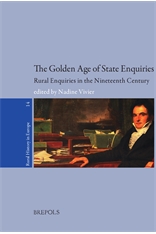Publications | Rural History in Europe
The Golden Age of State Enquiries. Rural Enquiries in the Nineteenth Century. From Fact Gathering to Political Instrument
The heart of the nineteenth century was the golden age of state enquiries in Europe. This international comparative study highlights the importance of transnational cultural tranfers and the enquiries as a means of construction of the nation state.Any state intervention in society requires a high degree of knowledge. This is usually given by a state-sponsored enquiry. Some of these surveys can be traced back to Antiquity, but by the nineteenth century enquiries proved to be different because the nature of the state and the distribution of political influence had changed, and the scientific and financial means to investigate had progressed. This new context prompted states to launch large enquiries to assess transformations in the rural world: new techniques, opening to long distance trade. The heart of the nineteenth century was the golden age of state enquiries. Inspired by the nascent sociology, they fulfilled the desire for scientific knowledge accessible to everyone and the search for innovative solutions for the improvement of agriculture and rural life.Most of those enquiries about the countryside are well known by historians who have built their work on the vast data collections. In a different approach, the present volume does not focus on their content; it examines the origins and functioning of the enquiries as new and important objects of historical research. Fourteen studies are gathered from across twelve countries. The main focus is on Western Europe, with broadening perspectives to the East (Ottoman Empire) and West (Canada and Mexico). The International comparative perspectives highlight the importance of transnational cultural transfers in the nineteenth-century Atlantic world. French and British methods were considered models of progress and of a civilized state. Statistical methods and the needs of the administration were discussed and adapted in each state according to their conception of state power, in the context of the construction of the nation state.
Nadine Vivier is Professor of social and economic history at the University of Maine (Le Mans, France). Her research interests focus on rural societies from 1750 to 2000 in France and in Europe.
 Actualités
Actualités
Forum de littérature médiévale comparée
 Conférence - Mercredi 24 avril 2024 - 18:00Le Forum de littérature médiévale comparée (Forum für mediävistische Komparatistik), site géré par Julia Rüthemann (post-doctorante au EHESS-CNRS, CRH, Université de Potsdam), Beatrice Trînca et Lea Braun, a le plaisir de vous inviter à sa troisième série de conférences en ligne au printemps 2024 !Ce Forum a pour but d’ouvrir un espace de discussion sur les approches comparatives en études médiévales et d’établir un réseau. Nous souhaitons regrouper(...)
Conférence - Mercredi 24 avril 2024 - 18:00Le Forum de littérature médiévale comparée (Forum für mediävistische Komparatistik), site géré par Julia Rüthemann (post-doctorante au EHESS-CNRS, CRH, Université de Potsdam), Beatrice Trînca et Lea Braun, a le plaisir de vous inviter à sa troisième série de conférences en ligne au printemps 2024 !Ce Forum a pour but d’ouvrir un espace de discussion sur les approches comparatives en études médiévales et d’établir un réseau. Nous souhaitons regrouper(...)
Lire l’État. Venise médiévale et ses territoires: représentations, cartographies, littératures
 Journée(s) d'étude - Lundi 29 avril 2024 - 09:00Ce Workshop est organisé par Christophe Austruy (EHESS-CNRS, CRH) et Giovanna Corazza (Università Ca’ Foscari - Venezia / University of Notre Dame, MSCA Fellow), dans le cadre de l’Atelier doctoral Histoire, Économie, Société et Culture dans l’Empire vénitien (Xe-XVIIIe siècle).Cet atelier s’articulera autour de recherches récentes sur les formes de représentations médiévales du territoire à travers le langage visuel de la cartographie et de ce(...)
Journée(s) d'étude - Lundi 29 avril 2024 - 09:00Ce Workshop est organisé par Christophe Austruy (EHESS-CNRS, CRH) et Giovanna Corazza (Università Ca’ Foscari - Venezia / University of Notre Dame, MSCA Fellow), dans le cadre de l’Atelier doctoral Histoire, Économie, Société et Culture dans l’Empire vénitien (Xe-XVIIIe siècle).Cet atelier s’articulera autour de recherches récentes sur les formes de représentations médiévales du territoire à travers le langage visuel de la cartographie et de ce(...)
Quantifier la Shoah. Classer, compter, modéliser / Quantifying the Holocaust. Classifying, Counting, Modeling
 Colloque - Mardi 14 mai 2024 - 08:45L'élaboration et la discussion des techniques d'enquête et d'analyse quantitatives percutent et renouvellent de nombreux champs de la recherche historique. Comment cela affecte-t-il les études sur la Shoah ? Ce colloque, oragisé par Claire Zalc (CNRS IHMC, EHESS, ERC Lubartworld), Robert Braun (UC Berkeley), Tal Bruttmann (Université de Cergy), Eva Kovacs, Institut Wiesenthal de Vienne pour les études sur l’Holocauste), Maël Le Noc (Mémorial de la Shoah, P(...)
Colloque - Mardi 14 mai 2024 - 08:45L'élaboration et la discussion des techniques d'enquête et d'analyse quantitatives percutent et renouvellent de nombreux champs de la recherche historique. Comment cela affecte-t-il les études sur la Shoah ? Ce colloque, oragisé par Claire Zalc (CNRS IHMC, EHESS, ERC Lubartworld), Robert Braun (UC Berkeley), Tal Bruttmann (Université de Cergy), Eva Kovacs, Institut Wiesenthal de Vienne pour les études sur l’Holocauste), Maël Le Noc (Mémorial de la Shoah, P(...)
ERHIMOR
EHESS-CRH
54 boulevard Raspail
75006 Paris
Tél. : +33 (0)1 49 54 24 42
ou : +33 (0)1 49 54 25 74
Fax : +33(0)1 49 54 23 99
Dernière modification :
18/04/2018



